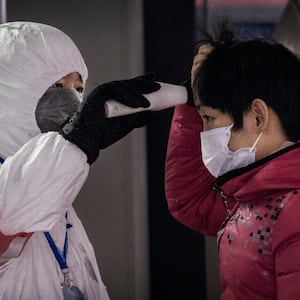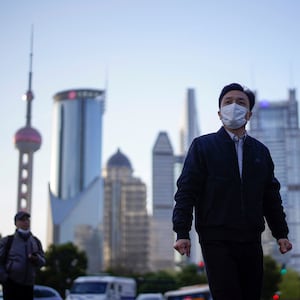As the Trump administration scrambles to get a hand on the spread of the new coronavirus across the U.S., it is keeping one eye on developments in China, the country where the pandemic originated.
According to two officials with knowledge of those efforts and cables reviewed by The Daily Beast, the administration is monitoring China’s second wave of coronavirus cases, gathering data on the ground on the number of individuals newly infected and the reasons for the recent uptick. Over the past few days Chinese officials have noted an emergence of new cases, particularly in asymptomatic individuals. But U.S. officials say it is difficult to trust Beijing’s numbers because of its history of putting out unreliable data.
The push for real-time intelligence on China’s new outbreak is an attempt by U.S. officials not only to study what factors can lead to a reemergence of the virus but also to get ahead of any attempt by Beijing to—yet again—put a spin on it, those same officials said.
ADVERTISEMENT
The White House is leaning on officials from across several agencies, including the State Department, Centers for Disease Control and the intel community to probe how Beijing is handling the new cases so as to better understand what the U.S. could expect later this year, when medical officials believe a second round of infections may happen as well.
The effort by the U.S. to gather new data in China could rattle an already delicate detente that Washington and Beijing appear to have reached on coronavirus messaging.
For weeks following the initial outbreak of the coronavirus in Wuhan, China, the Trump administration called out Beijing for misleading the world about the reality of the situation on the ground, claiming the lack of information and the silencing of health-care workers helped lead to the global spread of the virus. China relentlessly pushed back on that assertion and demanded that the U.S. stop referring to the coronavirus as the “Wuhan virus”—as several top Trump officials were doing.
Since then, both President Trump and President Xi have toned down the tough talk and the State Department in cables has refrained from referring to the coronavirus as the “Wuhan virus”. In public appearances and behind closed doors Trump has changed his tune, calling Xi his good “friend” and an “incredible guy”.
But officials who spoke to The Daily Beast said they worry that China could again manipulate its numbers, costing the U.S. and countries across the world valuable information needed to fight another wave of coronavirus cases.
According to one State Department cable reviewed by The Daily Beast, China’s National Health Commission appears to be linking the second wave with an uptick in individuals testing positive who do not show signs of symptoms. The Chinese government began reporting the number of asymptomatic cases on the mainland for the first time on April 1. As of last week China reported that 1,075 people with no signs of symptoms were “under medical observation.” About 135 of those individuals had tested positive for COVID-19.
“These asymptomatic infections include individuals who do not show any signs of illness but who have a positive laboratory test result for the virus that causes COVID-19,” the cable reads. “Asymptomatic infections represented about one-third of current cases [in mainland China] as of March 31.”
The fear of a second wave through asymptomatic individuals is concerning Chinese officials so much that some cities are now requiring individuals scan their QR health codes before riding public transportation. In Wuhan, the local government is reportedly considering “testing all residents to find asymptomatic persons due to fears of a second outbreak,” according to that same cable.
Like China, the Trump administration is increasingly worried about the spread of the coronavirus from asymptomatic or presymptomatic individuals. Last week, the Centers for Disease Control issued new guidelines advising Americans to wear cloth face covers or masks while around other people even if they did not feel sick.
The administration had hesitated on issuing such guidance in part out of concern that a run on medical masks would further hamper American hospitals that are struggling to procure personal protective equipment for their workers. In order to address that shortage, President Trump’s son-in-law Jared Kushner last week announced that he and White House adviser Peter Navarro were working with a team to help buy supplies like masks and gowns internationally, including from China. But the Chinese supplies are a subject of concern as well, after reports of faulty equipment in places such as Spain and the Netherlands.
According to a State Department cable, China last week implemented a new policy to ensure all of the medical supplies it planned to export were functioning correctly.
“The policy regulated exports of medical supplies including detection reagents, medical masks protective clothing, ventilators, and thermometers by requiring exporters to provide documentation that shipments meet China’s medical device product registration requirements,” the cable reads.
As the administration tries to track down accurate data in China on the new asymptomatic cases sweeping the country, it’s also looking to keep Chinese disinformation at bay.
In the State Department, officials have been tasked with flagging “news” stories and foreign cables that appear to propagate false information. For example, the State Department highlighted in a cable last week the statements made by Lu Shaye, the Chinese ambassador to France.
“Following international media reports that the COVID-19 death toll in Wuhan had been dramatically understated (as evidenced by the social media posts, now censored, showing a large number of urns and long lines of residents at government-operated crematoriums)… Shanye told French media that official statistics in Wuhan were accurate,” the cable reads. “When asked why the PRC government censored videos and pictures of the long queues of persons waiting to pick up urns, Lu said, ‘if they were censored, where did you get those pictures and videos?’”
The ambassador was referring to photos that spread on social media last week showing stacks of urns in Wuhan funeral homes. The photos have been deleted but their publishing raised additional questions about the true scale of the coronavirus crisis in China.








